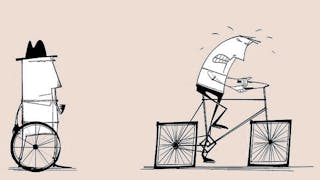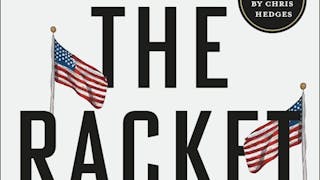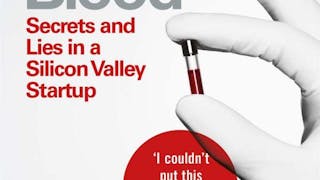Crazy at Work, Atomic Habits, and Purple Cow
Why self-help and business books remain largely subjective
Business and self-help books offer a lot of subjective opinions and blinded perspectives, yet they are the easiest to read and scan through. In this article, I quoted three of these popular books.
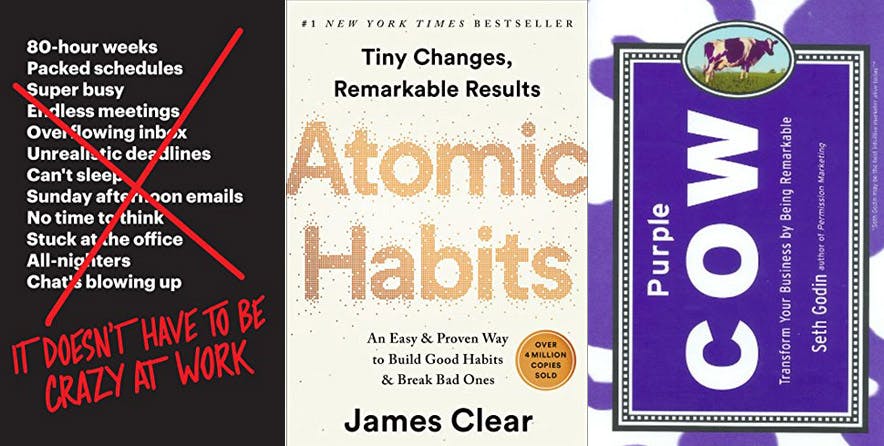
Business, professional, or self-help books are books that rarely make it to my shelf of want-to-read. Advice regarding business is not only subjective but also blind. They tell you how many failures a company had to go through before becoming successful. They don't tell you about the thousand other businesses that failed and never met success, nor about the failure of those same successful businesses, right after they wrote the book.
There are lessons to be learned, for sure, but they should be taken with a grain of salt. I target books that are highly recommended and easily scanned through. Here are some quotes from three of them, not necessarily the best.
It Doesn’t Have to Be Crazy at Work.
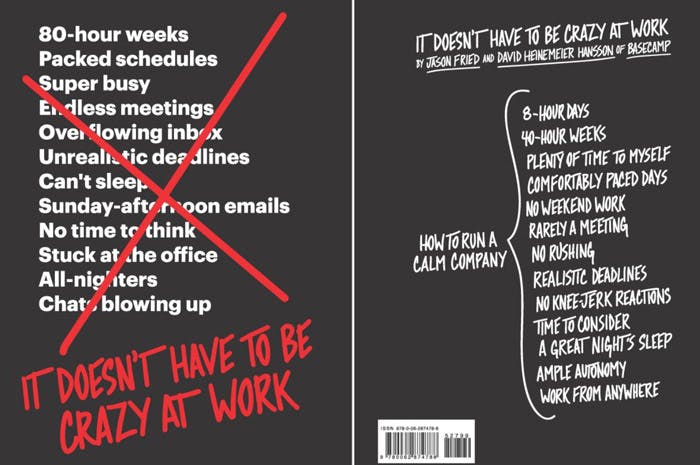
By Jason Fried and David Heinemeier Hansson
This book, along with the previous books Rework and Remote, is a fresh look at how businesses are conducted, and a challenge to the status quo. A lot of statements resonated with me.
But you rarely hear about people working three low-end jobs out of necessity wearing that grind with pride. It’s only the pretenders, those who aren’t exactly struggling for subsistence, who feel the need to brag about their immense sacrifice.
The majority of people work to make ends meet, they do not look for a self-satisfying career.
So imagine the response when we tell people that we don’t do goals. At all.
I am skeptical. The author claims that setting goals makes the business aim for bigger goals and thus creates an unhealthy environment where the only thing that matters is whether the goal was ambitious enough. Quite wasteful.
Almost everything can wait. And almost everything should.
That's always been my motto in life. Don't do Monday's work on Friday, because no one else will do it for you. It shall be there on Monday. You can almost always rely on its loyalty!
Companies love to declare “We’re all family here.” No, you’re not. Neither are we at Basecamp. We’re coworkers. That
Finally, some sanity in the world of Google insanity! "Cultural fit" is a keyword I regularly spot in job offers that turns me off and away.
Humans are humans whether they’re at work or at home.
So stop with your "communication skills" bar that everyone has to meet.
There’s no arbitrary “years of experience” cut to prevent a fast learner from applying to a senior position.
This one is going to be hard to apply in the business market. How do we measure? Many crazy people in the human resources industry are coming up with crazy ideas for measuring this ability to learn, ranging from creating fully workable examples in a week to live testing. Excuse me! Before you barge into my private life and consume my time with your imaginary task, don't you want to make sure I want to work for you in the first place?
Generally, businesses claim that they do not care about the number of years of experience; they lie. I attest.
A dismissal opens a vacuum, and unless you fill that vacuum with facts, it’ll quickly fill with rumors, conjecture, anxiety, and fear.
A fresh way to look at how to handle human emotions in the office. The status quo says: do not share details with the rest of the team!
Later is where excuses live. Later is where good intentions go to die. Later is a broken back and a bent spirit. Later says “all-nighters are temporary until we’ve got this figured out.” Unlikely. Make the change now.
Not sure this advice goes along with the statement: Almost everything can wait.
So don’t tie more knots, cut more ties. The fewer bonds, the better.
Speaking of their process in BaseCamp, fewer features are in every release, and old versions can stay old forever. Release the dependency. This feels like Functional Programming.
Instead, they should allow everyone to be heard and then turn the decision over to one person to make the final call. It’s their job to listen, consider, contemplate, and decide.
This is how efficient armies are run too, a leader or a general needs to know that after all the arguments, he can rely on his subjects to follow his command. Marriage works like this too, usually, the burden of making the decision is divided between the two. It is only feminists who accept their share of the burden and fight for his as well! Why crazy people?
If you want to know the truth about what you’ve built, you have to ship it. You can test, you can brainstorm, you can argue, you can survey, but only shipping will tell you whether you’re going to sink or swim.
That's how I roll in my freelance work. I create minimum viable products and urge my client to ship in order to test. It's the fastest way to find out whether it works, or it sinks.
When you deal with people who have trouble, you can either choose to take the token that says “It’s no big deal” or the token that says “It’s the end of the world.” Whichever token you pick, they’ll take the other.
Ouch! I should remember that. The authors state an example of a hotel staff who exaggerate the simple problems their customers come in with, which soothes them and forces them to accept any solution, versus the staff that acts as if it is not a big deal if the shower leaks a bit, which enrages their customers into a fury.
Review
This is a good book that, like its predecessors, takes a different approach to business management. It is clear proof that there is no one way for a business to work. Next time you run into someone giving advice about best practices,
recommend this book immediately. I give this book 3.5 out of 5 stars. (I keep my high ratings for other genres.)
Atomic Habits: Tiny Changes, Remarkable Results
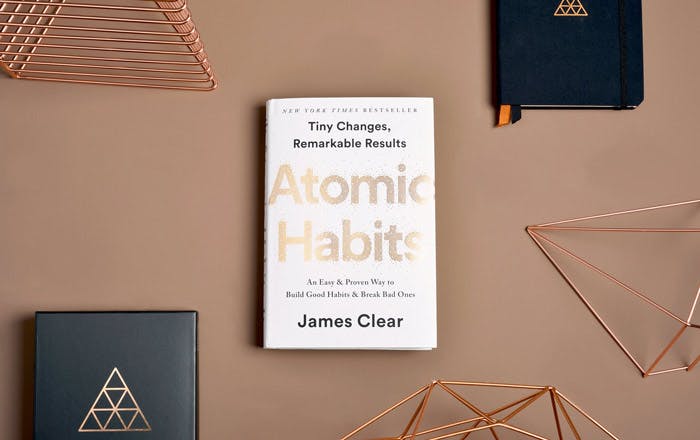
By James Clear
This is a self-help book of the type I usually avoid, but I heard too many citations and recommendations so I decided to read it.
The Diderot Effect states that obtaining a new possession often creates a spiral of consumption that leads to additional purchases.
I don't know who Diderot is or was, but that is common sense. Except that addicts don't usually use their senses to realize it.
In the end, they had little to show for their efforts other than unverified theories and one mediocre photo.
This is an interesting experiment run by a professor on his art students. He requires half of the students to produce as many photos as possible to get higher grades, and the other half to present one that they consider near perfect. The former half produced better results because they took action at a higher rate. The lesson is: Done is better than perfect.
The human brain did not evolve for life in a delayed-return environment.
I hate it when authors borrow the mythology of evolution for their texts! It is—nay—they are a group of a lot of theories that have never been proven! Stop with the pseudoscience, wouldya?
The first mistake is never the one that ruins you. It is the spiral of repeated mistakes that follows. Missing once is an accident. Missing twice is the start of a new habit.
It's never a tragedy, except in Hollywood movies. I remember the movie: Changing Lanes, where the guy who has an appointment with the judge to get visitation rights for his kids, gets into an accident that holds him back. He does not make it, and he loses his rights. Then he goes on cursing the days in a bar for what came of him. My take on that was: chill, mate! You do not miss one important appointment in life, you build a habit of missing appointments, till you have no friends in the world to accept your excuses.
The greatest threat to success is not failure but boredom.
So failure is now a threat, not a building block, as we've been told over and over again? I do not wish to dig into this one as the definition of success
is very subjective.
Goldilocks Rule.
The Goldilocks Rule states that humans experience peak motivation when working on tasks that are right on the edge of their current abilities.
Review
The book is the personal experience of the author of what works in terms of building habits. The author is an excellent storyteller, and I found the discussions around the main topic more interesting and entertaining. I give this book 3 out of 5 stars.
Purple Cow: Transform Your Business by Being Remarkable

By Seth Godin
Seth Godin is one of my favorite authors, a great storyteller, and a smart marketer. He knows how to set the right pitch, and frankly, can sell you sh*t for gold. Purple Cow is a book mainly about marketing. Here are my notes.
Nope, what’s missing isn’t the ideas. It’s the will to execute them.
We’ve been saying that forever, ideas are free, executing is everything.
The way you break through to the mainstream is to target a niche instead of a huge market. With a niche, you can segment off a chunk of the mainstream, and create an ideavirus so focused that it overwhelms that small slice of the market that really and truly will respond
Speaking of one way of creating what he calls an Ideavirus, an idea that travels fast and finds new hosts. For that to work, it must start with a community that is not only obsessed about the idea, but also keen on telling everyone they meet about this crazy new idea—which may not be astounding, but the trending reaction will cause it to travel great distances, creating a market.
If you’re remarkable, it’s likely that some people won’t like you. That’s part of the definition of remarkable. Nobody gets unanimous praise-ever.
True, some of us avoid going after great ideas, out of fear of being ridiculed. I myself have many times stopped myself from using market-known strategies to promote an idea, thinking I did not want to look too pushy or cheap.
Poilane refused to hire bakershe told me they had too many bad habits to unlearn-and instead hired young men who were willing to apprentice with him for years.
Ouch, that reality hurts. That is why we all should consider career changes every once in a while. Just to move the creative juices around.
Are you making very good stuff? How fast can you stop?
Very good is the opposite of remarkable. Very good in the same vein as creating ordinary, but much better. According to the author, this is like a disease!
The paradox is this: The same word of mouth that can make your product a huge hit can also lead to someone’s snickering at you.
No such thing as bad publicity, I guess.
Smart businesses target markets where there’s already otaku.
Otaku: (in Japan) a young person who is obsessed with computers or particular aspects of popular culture to the detriment of their social skills. It’s apparently easier to market to those people and sell them a product that relates to their obsession.
Can you create a culture of aggressively prototyping new products and policies? When GM shows a concept car at the New York Auto Show, there’s more than ego involved. They’re trying to figure out what car nuts think is remarkable. I’m not pitching focus groups here (they’re a waste). I’m talking about very public releases of cheap prototypes.
An oldie but a goodie. Perhaps I should now adopt that concept of aggressive prototyping.
The extreme nature of the product makes it appealing to this audience.
And perhaps I should ignore most of the criticism. I remember when I first worked in branding and naming, I tested with the name shut,
I got some serious down-voters and ignored them all. It was so popular that one day someone actually called at me hello shut!
One said it sounded like shit!
It’s a good name. Good branding. I stuck with it. (Shut Theory publication, Shut Framework, Shutter at LinkedIn!)
Review
The book is short and sweet. Filled with stories and gets to the point quickly. Although outdated but still holds. You might not agree with everything said, because after all, Seth comes from a capitalist nation, where material–is one of their Gods. Not Godin's best, he really is a good author. I give this 3 out of 5 stars.
Why you should be skeptical of business books
An example of why I generally avoid self-help books and business and professional books is an idea discussed in all three books above that go against each other. The idea of good, versus excellent.
In Crazy at Work, the authors are against setting goals and thus spend their energy on things that matter rather than exceeding expectations. In Atomic Habits, the author quotes: The best is the enemy of the good,
when he references a story where students spent more time perfecting photographs they ended up with worse results than their peers who just went out and shot as many photos no matter how good. In the Purple Cow, the author states: very good is the opposite of remarkable,
saying that we should stop trying to be very good. I am lost, are you not?




